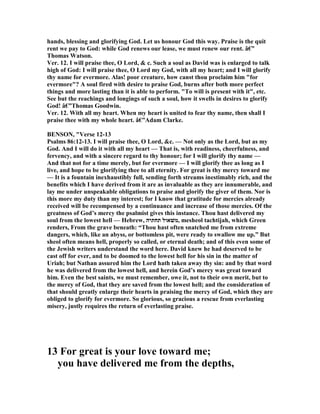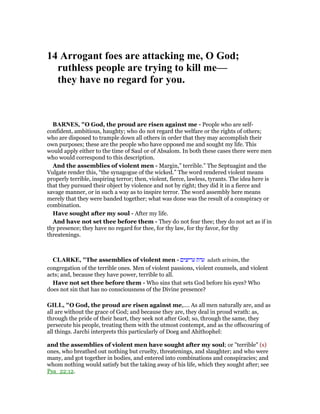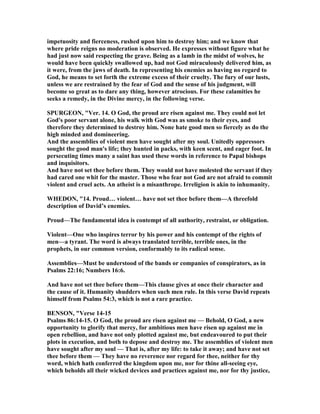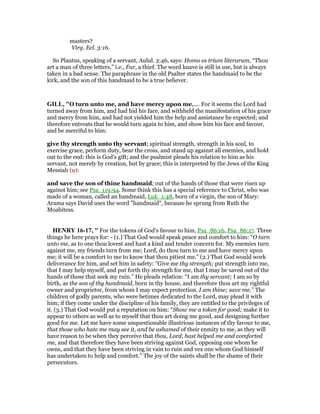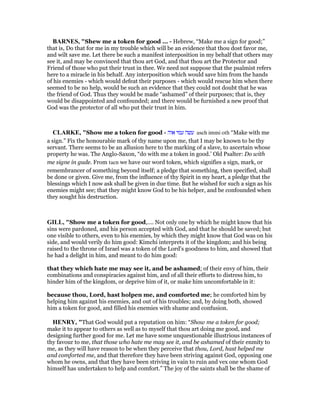Psalm 86 is a prayer attributed to David, reflecting his deep need for God's help amid affliction. It emphasizes the themes of humility and dependence on God, as David pleads for divine attention due to his state of poverty and need. The psalm combines elements of praise and supplication, showcasing the enduring nature of prayer across generations of believers.




![as they are an elogium or celebration of the glorious nature and excellencies of God,
to excite the sons of men to love and praise him. —Thomas Goodwin.
Title. —This Psalm was published under the title of A Prayer of David; not as if
David sung all his prayers, but into some of his songs he inserted prayers; for a
psalm will admit the expression of any pious and devout affections. But it is
observable how very plain the language of this psalm is, and how little there is in it
of poetical flights or figures, in comparison with some other psalms; for the
flourishes of wit are not the proper ornaments of prayer. —Matthew Henry.
Title. —There was much, very much, of God's peculiar character, his glorious
name, brought to view in the close of the last Psalm. This may account for its being
followed by another, A Prayer of David, almost equally full of the character of
Jehovah. The key note of this Psalm is Jehovah's name. —Andrew A. Bonar.
Whole Psalm. Christ prays throughout the whole of this Psalm. All the words are
spoken exclusively by Christ, who is both God and man. —Psalt. Cassiodori, 1491.
Whole Psalm. In this Psalm Christ the Son of God and Son of Man, one God with
the Father, one man with men, to whom we pray as God, prays in the form of a
servant. For he prays for us, and he prays in us, and he is prayed to by us. He prays
for us as our Priest. He prays in us as our Head. He is prayed to by us as our God. â
€”Psalt. Pet. Lombard. 1474.
Ver. 1. Bow down thine ear, O Lord. As the careful physician doth to his feeble
patient: so Basil glosseth here. —John Trapp.
Ver. 1-4. Poor, holy, trusteth, I cry. The petitioner is first described as poor, then
holy, next trusting, after that crying, finally, lifted up to God. And each epithet has
its fitting verb; bow down to the poor, preserve the holy, save the trusting, be
merciful to him who cries, rejoice the lifted up. It is the whole gamut of love from
the Incarnation to the Ascension; it tells us that Christ's humiliation will be our
glory and joy. — eale and Littledale's Commentary.
BE SO , "Psalms 86:1. Bow down thine ear, O Lord — When God hears our
prayers he is fifty said to bow down his ear to them, for it is great condescension in
him even to take notice of such mean creatures as we are, and much more to hear
our defective and unworthy prayers. For I am poor and needy — Forsaken and
persecuted by men, and utterly unable to save myself, and therefore a proper object;
in behalf of whom thy power and goodness may be exerted. Observe, reader, “All
prayer is founded on a sense of our own wants, and God’s ability to supply them. In
the sight of his Maker every sinner is poor and needy; and he must become so in his
own, that his petitions may be regarded; he must pray with the humility and
importunity of a starving beggar, at the gate of heaven, if he expect the great King
to bow down his ear and hear him.” — Horne.
COFFMA , "Verse 1
PSALM 86
A PSALM OF SUPPLICATIO A D TRUST
"This is the only Psalm of David in the Third Book of the Psalter."[1] Of course,
Kidner here was following the superscription which thus assigns it. Jones also](https://image.slidesharecdn.com/psalm86commentary-160611025259/85/Psalm-86-commentary-5-320.jpg)
![accepted this, stating that, "There is no sufficient grounds for disputing David's
authorship of it."[2] Rawlinson likewise affirmed that, "The Psalm contains
nothing, either in matter or style, to make the ascription unlikely."[3]
This being true, why then, do most modern commentators reject the Davidic
authorship of this Psalm? Delitzsch declared that, "It can be called `A Psalm of
David' as having grown out of Davidic and other model passages."[4] He then went
on to point out at least 30 allusions and/or quotations from other Biblical passages,
saying that, "Almost everything is an echo of the language of other Psalms or of the
Law,"[5] McCaw referred to the psalm as "A Mosaic."[6] We agree with Miller's
comment that, "It may be that others have borrowed from this Psalm."[7] othing
in our own studies has convinced us that modern scholars are actually competent to
decide such questions upon the basis of the limited information available to them. In
the very nature of the problem, they have to do a lot of "guessing"; and the guesses
of the ancient authors of the superscription are just as good as the "guesses" men
offer so generously today.
Psalms 86:1-5
GOD'S GOOD ESS A E COURAGEME T TO SEEK HIM
"Bow down thine ear, O Jehovah, and answer me;
For I am poor and needy.
Preserve my soul; for I am godly:
O thou my God save thy servant that trusteth in thee.
Be merciful unto me, O Lord;
For unto thee do I cry all the day long.
Rejoice the soul of thy servant;
For unto thee, O Lord, do I lift up my soul.
For thou, Lord, art good, and ready to forgive,
And abundant in lovingkindness unto all them that call upon thee."
An unusual feature of this psalm is that, "Each petition is accompanied by a reason
why the petition should be granted."[8] ote the reasons given in Psalms 86:1, "I
am poor and needy"; and in Psalms 86:2, "for I am godly." etc.
"I am poor and needy" (Psalms 86:1). "These words do not necessarily reveal the
financial circumstances of the psalmist; they indicate the need of help from God, in](https://image.slidesharecdn.com/psalm86commentary-160611025259/85/Psalm-86-commentary-6-320.jpg)
![this case help because of the arrogant and violent men of (Psalms 86:14-17)."[9]
"For I am godly" (Psalms 86:2). We cannot allow these words in the mouth of David
in the sense of their ordinary meaning. What is meant is that he was loyal to God,
[10] that "I am devoted to you and trust you,."[11] or simply that he belonged to the
covenant people of Israel.
"Unto thee do I cry ... I lift up my soul" (Psalms 86:3-4). These are "reasons why"
the psalmist believes God should hear his petition.
"Thou, Lord, art good ... ready to forgive ... abundant in lovingkindness" (Psalms
86:5). The wonderful goodness, mercy, lovingkindness, and readiness of God to
forgive the penitent - all of these are abundant encouragements indeed for men to
seek God in prayer. With such a God, ready and willing to help us, who should
neglect to pray?
EXPOSITORS DICTIO ARY OF TEXTS, "A Pattern of Prayer
Psalm 86:1-5
The prayer that springs from a deep-felt need, and will not cease till that need is
supplied, may say the same things over a hundred times, and yet they shall not be
vain.
I. The Invocations. In general, this Psalm is remarkable for its frequent use of the
Divine names. In almost every verse they recur, and their frequency gives us a vivid
impression of earnestness, of consciousness of need, and of faith so sore pressed that
it could only sustain itself by perpetual renewal of its grasp of God. Five times in
these verses of our text does he invoke Him, and that by three several names—
Jehovah, my God, Lord. These three sacred names have each a distinct meaning
when used in prayer; they bring up various aspects of the character of God as the
basis of our confidence, and the ground of our petitions. Song of Solomon , then,
when we blend all these together, it is as if the Psalmist had said: "The ever living,
the covenant Jehovah, my God in whom I claim a personal interest, who loves me
with an individualizing love, and cares for me with a specific care, the absolute
monarch and sovereign of the whole universe is He to whom I come with my
supplication. I think of His names, I trust in them, I present them to Him, whom
they all but partially declare; and I ask Him—for His own name"s sake, because of
what He is and hath declared Himself to be, to hear my poor cry, to answer my
imperfect faith, to show Himself yet once again that which His name hath from old
proclaimed Him to be."
II. So much then for the invocation, and now a word or two in reference to the
petitions which these verses give us. As I have said, they are all substantially the
same, and yet they so vary as to suggest how familiar all the aspects of the
deliverance that the Psalmist desires were to him. The way in which God"s mercy is](https://image.slidesharecdn.com/psalm86commentary-160611025259/85/Psalm-86-commentary-7-320.jpg)



![SIMEO , "A PRAYI G SPIRIT EXEMPLIFIED
Psalms 86:1-5. Bow down thine ear, O Lord! hear me; for I am poor and needy.
Preserve my soul; for I am holy O thou my God, save thy servant that trusteth in
thee! Be merciful unto me, O Lord! for I cry unto thee daily. Rejoice the soul of thy
servant: for unto thee, O Lord, do I lift up my soul. For thou, Lord, art good, and
ready to forgive; plenteous in mercy unto all them that call upon thee.
TRUE and genuine piety cannot always be certainly known by men’s intercourse
with their fellow-creatures. Appearances may be so plausible, that they cannot,
except by Him who searcheth the heart, be distinguished from realities. But in their
intercourse with the Deity, the truth or falsehood of their profession may be clearly
discerned. The most refined hypocrite may, by examining the state of his soul in his
private devotions, obtain the certain means of discovering his proper character,
provided he have his standard rightly fixed, and his test impartially applied. To
furnish such a standard, is our object in the present discourse. We here behold the
man after God’s own heart drawing nigh to a throne of grace, and pouring out his
soul in supplications before God: and we wish to call your attention especially to the
spirit which he manifested in this sacred duty, since it will serve as an excellent
criterion whereby to try and judge ourselves.
Let us then consider,
I. The subject-matter of his prayer—
It should seem that David was now under great affliction, either from the
persecutions of Saul, or from the unnatural rebellion of his son Absalom: and his
prayers may well be understood, in the first instance, as relating to his temporal
trials. But, as it is of his soul that he chiefly speaks, we shall dwell upon his prayer
principally in that view. Let us notice then,
1. His petitions—
[St. Paul, in both his Epistles to Timothy, prays, that “grace, and mercy, and peace”
may be multiplied upon him. These three terms comprehend the substance of the
Psalmist’s petitions. He desired “grace,” to “preserve and save his soul.” He desired
“mercy;” “Be merciful unto me, O Lord!” And he desired “peace;” “Rejoice the
soul of thy servant, O Lord!” ow these are such petitions as every sinner in the
universe should offer. There are no other that can be compared with them, in point
of importance to the souls of men. As for all the objects of time and sense, they sink
into perfect insignificance before the things which appertain to our everlasting
salvation. To all therefore I would say, Seek what David sought. Cry mightily to
God to have mercy upon you, and to preserve and save your soul: and when you
have done that, you may fitly pray also for that consolation and joy, which a sense of
his pardoning love will produce in the soul.]
2. His pleas—](https://image.slidesharecdn.com/psalm86commentary-160611025259/85/Psalm-86-commentary-11-320.jpg)
![[These are taken, partly, from what he experienced in his own soul; and, partly,
from the character of God himself.
Observe how he urges, what he experienced in his own soul. The things which God
himself requires from us, in order to the acceptance of our prayers, are, a deep sense
of our necessities, an entire surrender of our souls to him, a reliance on him for all
needful blessings, and a continual application to him in a way of fervent and
believing prayer. Behold, these are the very things which David at this time
experienced, and which therefore he pleaded before God as evidences of the
sincerity of his prayers: “Bow down thine ear, O Lord, and hear me; for I am poor
and needy!” And who is there that must not adopt the same acknowledgment? Who
that considers, how destitute his soul is of all that is truly good, will not find these
words exactly descriptive of his state? Again, the Psalmist prays, “Preserve my soul;
for I am holy” We must not imagine that David here meant to boast of his high
attainments in holiness: the term “holy” is applied in Scripture to every thing that is
dedicated to God, though from its very nature it cannot possess any inherent
sanctity: the temple of God, the vessels of the sanctuary, and all the offerings, were
holy, because they were set apart for God. So David here speaks of himself as “set
apart for God [ ote: See Psalms 4:3.]:” and his expression is exactly equivalent to
that which he uses in another place; “I am thine; save me [ ote: Psalms 119:94.].”
This then is another plea which it becomes us all to use. As the Israelites were “a
holy nation [ ote: Exodus 19:6.],” so are we [ ote: 1 Peter 2:9.]: and if we have
given up ourselves unreservedly to God, we may well hope, that he will hear and
answer our petitions. Once more David says, “Save me; for I trust in Thee.” This
also was a most acceptable plea. If we ask with a wavering and doubtful mind, we
can never succeed [ ote: James 1:6-7.]: but the prayer of faith must of necessity
prevail [ ote: Matthew 21:22. Mark 11:24.]. The suppliant who truly and habitually
trusts in God, can never be disappointed. Lastly, David says, “I cry unto thee daily:”
“Unto thee, O Lord, do I lift up my soul.” God “will be inquired of, to do for us the
things that he has promised.” “If we ask, we shall have; if we seek, we shall find; if
we knock, it shall be opened unto us [ ote: Matthew 7:7-8.]:” but, if we ask not, we
shall not, we cannot, have [ ote: James 4:2.].
But David’s chief plea is taken from the character of God himself: and this is, in
reality, the most satisfactory to the human mind, and most acceptable to the Divine
Majesty, who “will work for his own great ame’s sake,” when all other grounds of
hope are subverted and lost. Towards his creatures generally, whether rational or
irrational, God is “good;” but towards the children of men he is “ready to forgive,
and plenteous in mercy unto all that call upon him.” o mother is so tender towards
her new-born child, as God is towards his penitent and believing people. He is far
more “ready to forgive,” than they are to ask forgiveness; and will multiply his
pardons beyond all the multitude of their offences [ ote: Isaiah 55:7-9.]. “Where sin
has abounded, his grace shall much more abound [ ote: Romans 5:20.].” The
freeness and fulness of God’s grace should be clearly seen, and confidently relied
upon: but then we must never forget, that this glorious perfection shines only in the
face of Jesus Christ. It is in Christ only that God can pardon sinners in consistency](https://image.slidesharecdn.com/psalm86commentary-160611025259/85/Psalm-86-commentary-12-320.jpg)
![with his justice: but in Christ, “he is faithful and just to forgive us our sins, and to
cleanse us from all unrighteousness [ ote: Romans 3:24-25.].” In Christ therefore,
and in God as reconciled to us through the blood of his Son, must be all our hope. If
we rest solely on Christ’s obedience unto death, all will be well; for “in him all the
promises of God are yea, and amen [ ote: 2 Corinthians 1:20.].” But, if we look at
God in any way but as in the person of Christ, we shall surely find him “a
consuming fire [ ote: Hebrews 12:29.].”]
The prayer itself not calling for any farther elucidation, we proceed to notice,
II. The spirit manifested in it—
Here the subject is peculiarly important, because it exhibits in so striking a view the
dispositions of mind which we should invariably exercise in our approaches to the
Divine Majesty. In this example of David, then observe,
1. His meekness and modesty—
[He approaches God, as a sinner ought to do, with reverential awe. He exhibits none
of that unhallowed boldness, and indecent familiarity, which are so commonly to be
noticed in the prayers of many at this day. It is much to be lamented that many
address God almost as if he were an equal. We speak not now of that irreverence
with which people, altogether ignorant of religion, conduct themselves in the public
services of the church; (though that is deeply to be deplored;) but of the state of
mind manifested by many religious people, ministers, as well as others, in their
public and social addresses to the throne of Heaven. How different, alas! is it from
that which is inculcated, both in the Scriptures [ ote: Psalms 89:7. Ecclesiastes
5:2.], and in the Liturgy of our Church! In the Liturgy, the people are exhorted to
“accompany their minister with a pure heart and humble voice to the throne of the
heavenly grace:” and, in another place, “to make their humble confession to
Almighty God, meekly kneeling on their knees.” This is a lovely state of mind, and
as opposite to that which many religious people manifest, as light to darkness. Many
whose religious principles differ widely from the self-applauding Pharisee, resemble
him very nearly in his spirit and conduct: but let us, on the contrary, imitate the
publican, who, “not venturing so much as to lift up his eyes to heaven, smote upon
his breast, and cried, God be merciful to me a sinner.”]
2. His humility and contrition—
[He felt himself a guilty and undone creature, deserving of God’s everlasting
displeasure: and hence he cried so repeatedly for mercy and salvation, And here
again we see how the same views and dispositions are inculcated in the services of
our Church. Let any one peruse the confession which is daily offered — — — or
that which we are taught to utter at the table of the Lord — — — or let him read
the responses after every one of the Ten Commandments — — — or the repeated
cries, “Lord, have mercy upon me! Christ, have mercy upon me! Lord, have mercy
upon me!” and he will see at once, what a beautiful harmony there is between our](https://image.slidesharecdn.com/psalm86commentary-160611025259/85/Psalm-86-commentary-13-320.jpg)
![Liturgy and the Holy Scriptures; and what distinguished saints all her members
would be, if the Spirit of her Liturgy were transfused into their minds. This is the
state of mind which, above all, we would recommend to those who desire to find
acceptance with God: for “to this man will God look, even to him who is of a broken
and contrite spirit [ ote: Isaiah 57:15; Isaiah 65:2.]:” this is the sacrifice which,
above all, God requires, and which he has assured us “he will never despise [ ote:
Psalms 51:17.].”]
3. His faith and love—
[David did not so view his own sinfulness as to distrust the mercy of his heavenly
Father; but rather took occasion from his own sinfulness to magnify still more the
free and supera-bounding grace of God. In this, his example is especially to be
followed. othing can warrant us to limit the mercy of our God. O how “ready is he
to forgive” returning penitents! Of this, the conduct of the father towards the
repenting prodigal is a lively and instructive image. In that parable, the compassion
of God towards returning sinners is, as it were, exhibited even to the eye of sense.
Let us then, whatever be our state, bear this in mind, that unbelief is a sin which
binds all our other sins upon us. ever, under any circumstances, should we
harbour it for a moment. It is enough to have resisted God’s authority, without
proceeding further to rob him of the brightest jewels of his crown—his grace and
mercy. The goodness of God, as described in our text, and in another subsequent
part of this psalm [ ote: ver. 15.], — — — is a sufficient pledge to us, that of those
who come to him in his Son’s name, he never did, nor ever will, cast out to much as
one.]
4. His zeal and earnestness—
[The diversified petitions and pleas which we have already considered, together with
the renewed urgency of his supplications in the verse following my text [ ote: ver.
6.], shew, how determined David was not to rest, till he had obtained favour of the
Lord. And thus must we also “continue instant in prayer:” we must “watch unto it
with all perseverance;” we must “pray always, and not faint.” Alas! how are we
condemned in our own minds for our manifold neglects, and for our lukewarmness
in prayer to God! But we must not rest satisfied with confessing these neglects: we
should remedy them, and break through this supineness, and correct this
negligence, and lie at Bethesda’s pool till the angel come for our relief. This is
suggested to us in our text. What we translate, “I cry unto thee daily,” is, in the
margin, “I cry unto thee all the day.” O that there were in us such a heart! O that
our sense of need were so deep, our desire of mercy so ardent, and our faith in God
so assured, that we were drawn to God with an irresistible and abiding impulse; and
that, like Jacob of old, we “wrestled with him day and night, saying, I will not let
thee go except thou bless me [ ote: Genesis 32:24; Genesis 32:26; Genesis 32:28.
with Hosea 12:3-5.].” Such prayer could not but prevail; and such a suppliant could
not but find everlasting acceptance with God, who is so “plenteous in mercy, so
ready to forgive [ ote: Luke 18:1-8.].”]](https://image.slidesharecdn.com/psalm86commentary-160611025259/85/Psalm-86-commentary-14-320.jpg)
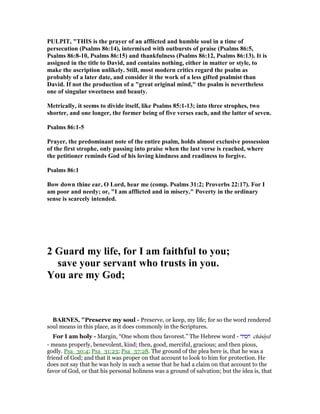

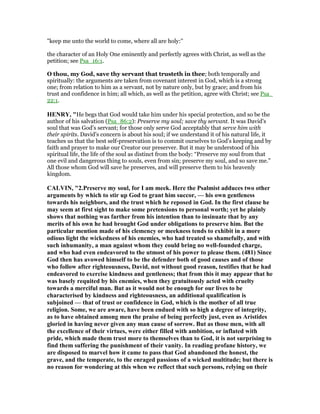


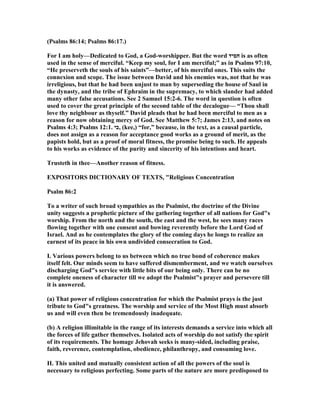









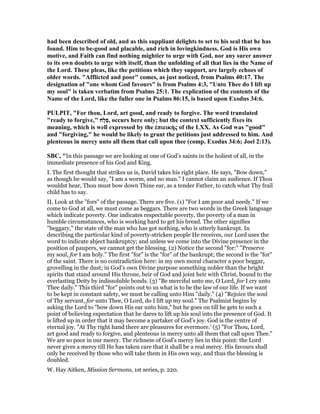





![BAR ES, "Give ear, O Lord, unto my prayer ... - See the notes at Psa_5:1.
CLARKE, "Give ear, O Lord - Attend to me. Millions call upon thee for help and
mercy; but who has more need than myself? That the psalmist was deeply in earnest, his
conduct shows.
1. He prayed.
2. His prayer was vehement; he lifted up his voice.
3. He continued in prayer; he abounded in supplications.
GILL, "Give ear, O Lord, unto my prayer,.... As this psalm is called, in the title of
it; his own prayer, and not another's, not one composed for him, but what was composed
by him; this petition is repeated, as to the sense of it, from Psa_86:1 to show his
importunity to be heard:
and attend to the voice of my supplications; which proceeded from the spirit of
grace and supplication, put up in an humble manner, in a dependence on the mercy of
God, which the word used has the signification of, and were attended with thanksgiving,
Psa_86:12, according to the apostle's rule, Phi_4:6, these were vocal prayers, and not
mere mental ones; see Heb_5:7.
HE RY, "He is a prayer-hearing God; he is plenteous in mercy, very full, and very
free, both rich and liberal unto all those that call upon him; he has wherewithal to
supply all their needs and is openhanded in granting that supply. 4. He pleads God's
good work in himself, by which he had qualified him for the tokens of his favour. Three
things were wrought in him by divine grace, which he looked upon as earnests of all
good: - (1.) A conformity to God (Psa_86:2): I am holy, therefore preserve my soul; for
those whom the Spirit sanctifies he will preserve. He does not say this in pride and vain
glory, but with humble thankfulness to God. I am one whom thou favourest (so the
margin reads it), whom thou hast set apart for thyself. If God has begun a good work of
grace in us, we must own that the time was a time of love. Then was I in his eyes as one
that found favour, and whom God hath taken into his favour he will take under his
protection. All his saints are in thy hand, Deu_33:3. Observe, I am needy (Psa_86:1),
yet I am holy (Psa_86:2), holy and yet needy, poor in the world, but rich in faith. Those
who preserve their purity in their greatest poverty may assure themselves that God will
preserve their comforts, will preserve their souls. (2.) A confidence in God: Save thy
servant that trusteth in thee. Those that are holy must nevertheless not trust in
themselves, nor in their own righteousness, but only in God and his grace. Those that
trust in God may expect salvation from him. (3.) A disposition to communion with God.
He hopes God will answer his prayers, because he had inclined him to pray. [1.] To be
constant in prayer: I cry unto thee daily, and all the day, Psa_86:3. It is thus our duty to
pray always, without ceasing, and to continue instant in prayer; and then we may hope](https://image.slidesharecdn.com/psalm86commentary-160611025259/85/Psalm-86-commentary-36-320.jpg)
![to have our prayers heard which we make in the time of trouble, if we have made
conscience of the duty at other times, at all times. It is comfortable if an affliction finds
the wheels of prayer a-going, and that hey are not then to be set a-going. [2.] To be
inward with God in prayer, to lift up his soul to him, Psa_86:4. Then we may hope that
God will meet us with his mercies, when we in our prayers send forth our souls as it were
to meet him. [3.] To be in a special manner earnest with God in prayer when he was in
affliction (Psa_86:7): “In the day of my trouble, whatever others do, I will call upon
thee, and commit my case to thee, for thou wilt hear and answer me, and I shall not seek
in vain, as those did who cried, O Baal! hear us; but there was no voice, nor any that
regarded,” 1Ki_18:29.
CALVI , "6Listen, O Jehovah! to my prayer. From the earnest repetition of his
former requests in this and the subsequent verse, it is evident that he was oppressed
with no ordinary degree of grief, and also agitated with extreme anxiety, From this
example, we are taught that those who, having engaged in prayer once, allow
themselves immediately to give over that exercise, provided God does not at once
grant them their desire, betray the coldness and inconstancy of their hearts. or is
this repetition of the same requests to be thought superfluous; for hereby the saints,
by little and little, discharge their cares into the bosom of God, and this importunity
is a sacrifice of a sweet savor before Him. When the Psalmist says, God will hear me
when I cry in the day of trouble, he makes a particular application to himself of the
truth which he had just now stated, That God is merciful and gracious to all who
call upon him.
SPURGEO , "Ver. 6. Give ear, O LORD, unto my prayer. Even the glory which his
spirit had beheld did not withdraw him from his prayer, but rather urged him to be
more fervent in it; hence he implores the Lord to hear his requests.
Attend to the voice of my supplications. Here are repetitions, but not vain
repetitions. When a child cries it repeats the same note, but it is equally in earnest
every time, and so was it with the suppliant here. ote the expression, "the voice of
my supplications", as if they were not all voice but were partly made up of
inarticulate noise, yet amid much that was superfluous there really was a distinct
voice, an inner meaning, a living sense which was the heart's intention. This he
would have the Lord sift out from the chaff, and hear amid the mingled din. May
our prayers never be voiceless; may the soul's intent always give them a live core of
meaning.
EXPLA ATORY OTES A D QUAI T SAYI GS.
Ver 6. Supplications ytwnwxt, deprecations. The Psalmist forms a peculiar Hebrew
word, feminine plural, not found elsewhere, to convey more impressively the idea of
suppliant weakness. —A.R. Fausset.
BE SO , "Verse 6-7
Psalms 86:6-7. Give ear, O Lord, &c. — He repeats and multiplies his requests, both
to ease his own troubled mind, and prevail with God, who is well pleased with his
people’s importunity in prayer, Luke 18:1, &c. For thou wilt answer me — Whereof](https://image.slidesharecdn.com/psalm86commentary-160611025259/85/Psalm-86-commentary-37-320.jpg)
![I have assurance, both from the benignity of thy nature, and from the truth and
certainty of thy promises, and from my own experience, and that of others in former
times
PULPIT, "Give ear, O Lord, unto my prayer. An echo of Psalms 86:1. The psalmist
begins, as it were, afresh, calling God's attention to himself, as if he had not yet
spoken. And attend to the voice of my supplications (comp. Psalms 17:1; Psalms
55:2; Psalms 61:1, etc.). That God's ear is always attent to the prayers of his people
does not make it superfluous for them to entreat his attention. He will listen more
favourably when besought to listen.
COFFMA , "Verse 6
GOD'S OM IPOTE CE E COURAGEME T TO SEEK HIM
"Give ear, O Jehovah, unto my prayer;
And hearken unto the voice of my supplications.
In the day of my trouble, I will call upon thee;
For thou wilt answer me.
There is none like unto thee among the gods, O Lord;
either are there any works like unto thy works.
All nations whom thou has made shall come and worship before thee, O Lord;
And they shall glorify thy name.
For thou art great, and doest wondrous things:
Thou art God alone."
The supremacy of the One God, his eternal omnipotence, his unlimited authority,
his very uniqueness - all these are encouragements for me to seek God and turn to
him for help, for forgiveness and salvation. There is none other from whom men
could expect the slightest help or attention of any kind.
"There is none like unto thee among the gods" (Psalms 86:8). "It is probable that
David is here speaking of angels,"[12] was the opinion of Kidner; but we cannot
accept this. owhere in the entire Bible, as far as this writer has been able to
determine, are angels called "gods." The evil judges Of Israel were sarcastically
called `gods'; and aside from that, only the false deities of the pagan world are
referred to as `gods.' Besides that, it would be utterly meaningless for the psalmist to
have declared that there were none among the "angels" like God! How could](https://image.slidesharecdn.com/psalm86commentary-160611025259/85/Psalm-86-commentary-38-320.jpg)
![Almighty God be thus compared to his creatures? We appreciate Miller's
discernment: "Psalms 86:8 is a reference to pagan gods."[13]
"All the nations whom thou hast made shall come and worship before thee" (Psalms
86:9). Such an expression as this is indeed worthy of David himself. ot only is God
extolled here as the creator of all nations, but there is anticipated the magnificent
promises of the ew Testament that "In the name of Jesus, every knee shall bow ...
and every tongue shall confess that Jesus Christ is Lord to the glory of God the
Father" (Philippians 2:10-11).
"Thou art great... Thou art God alone" (Psalms 86:10). In the same verse, the
wonderful works of God are mentioned. Such works of God as the Creation, the
ordering of the whole cosmos with clock-like precision, and the providential
oversight of all men and of all nations - such wonderful works as these surpass, by
far, the most fantastic and extravagant false claims in the mythological falsehoods of
the pagan gods.
Only the God of Abraham, and of Isaac, and of Jacob, in short, the God of the
Hebrew Scriptures and of the ew Testament is indeed God alone. This is the most
important fact known to mankind. Is there really and truly an omnipotent GOD
who created and sustains all things? who holds every man ever born accountable for
his deeds, and who at the end of the age will summons the myriads of the earth to
the Judgment of the Great Day, and upon that occasion will appoint every man to
the eternal destiny which he deserves?
If one is looking for the "Sixty-Four Trillion Dollar Question," we have just stated
it. As Robert Flynt, the president of the University of Scotland once said, "Is there
any such thing as the supernatural? In the final analysis, all other questions finally
fade into the cosmic background." It is the genius of the Holy Bible that this soul-
searching question is intelligently and logically answered. YES! God is, and is a
Rewarder of them that diligently seek him."
EBC, "Psalms 86:6-13 may be taken together, as the prayer proper, to which Psalms
86:1-5 are introductory. In them there is first, a repetition of the cry for help, and of
the declaration of need (Psalms 86:6-7); then a joyful contemplation of God’s
unapproachable majesty and works, which insure the ultimate recognition of His
ame by all nations (Psalms 86:8-10); then a profoundly and tenderly spiritual
prayer for guidance and consecration-wants more pressing still than outward
deliverance (Psalms 86:11); and, finally, as in so many psalms, anticipatory
thanksgivings for deliverance yet future, but conceived of as present by vivid faith.
Echoes of earlier psalms sound through the whole; but the general impression is not
that of imitation, but of genuine personal need and devotion. Psalms 86:7 is like
Psalms 17:6 and other passages; Psalms 86:8 a is from Exodus 15:11; Psalms 86:8 b
is modelled on Deuteronomy 3:24; Psalms 86:9, on Psalms 22:27; Psalms 86:11 a, -
on Psalms 27:11; Psalms 86:11 b, on Psalms 26:3; "Sheol beneath" is from](https://image.slidesharecdn.com/psalm86commentary-160611025259/85/Psalm-86-commentary-39-320.jpg)
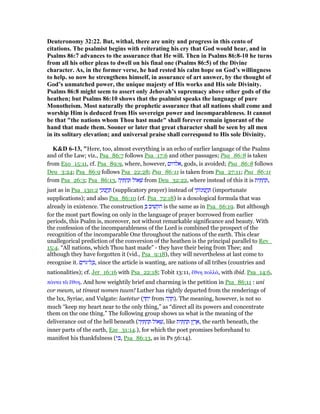
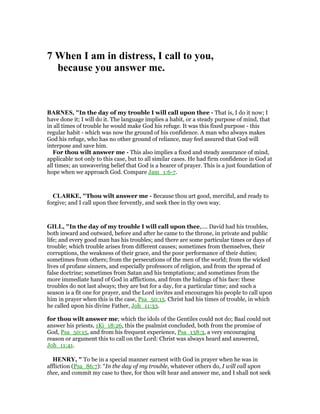
















![or deviation in practice, believing all things which God hath revealed, and doing
whatsoever he hath commanded us; that the affections of our hearts may be
withdrawn from other objects, and, being no longer divided between God and the
world, may become united in the filial fear of his name: as the grand principle of
action.”
COFFMA , "Verse 11
GOD'S PRIOR MERCIES E COURAGEME T TO SEEK HIM
"Teach me thy way, O Jehovah; I will walk in thy truth:
Unite my heart to fear thy name.
I will praise thee, O Lord my God, with my whole heart;
And I will glorify thy name forevermore.
For great is thy lovingkindness toward me;
And thou hast delivered my soul from the lowest Sheol.
O God, the proud are risen up against me,
And a company of violent men have sought after my soul,
And have not set thee before them.
But thou, O Lord, art a God merciful and gracious.
Slow to anger, and abundant in lovingkindness and truth.
Oh turn unto me, and have mercy upon me
Give thy strength unto thy servant,
And save the son of thy handmaid.
Show me a token for good,
That they who hate me may see it, and be put to shame,
Because thou, Jehovah, has helped me and comforted me."
"Teach me thy way ... I will walk in thy truth" (Psalms 86:11). "David is here
praying for God to help him form the right habits."[14] Anchor Bible renders this
verse: "Teach me your way, that I may walk faithful to you alone."[15]](https://image.slidesharecdn.com/psalm86commentary-160611025259/85/Psalm-86-commentary-58-320.jpg)
!["Great is thy lovingkindness toward me" (Psalms 86:13). We have often commented
upon David's frequent use of this term in psalms that are admittedly his; and we
find the term in this psalm no less than three times in Psalms 86:5,13,15.
"The proud ... a company of violent men ... who set not thee before them" (Psalms
86:14). The evil men described here were proud (arrogant), violent (ruthless),
unbelievers who took not God into their thoughts.
"But thou, O lord, art a God merciful and gracious, slow to anger, and abundant in
lovingkindness" (Psalms 86:15). This verse is a quotation verbatim from Exodus
34:6b.
"Save the son of thy handmaid" (Psalms 86:16). Delitzsch explained this "The
psalmist calls himself the `son of thy handmaid,' as having been born into his
personal relation to God, as a servant, a relation that came to him by birth. How
beautifully does the word "Lord" come in here for the seventh time. He is even from
his mother's womb the servant of the Sovereign Lord, from whose omnipotence he
can therefore look for a miracle on his behalf."[16]
"Show me a token ... that they who hate me may see and be put to shame" (Psalms
86:17). The Anchor Bible's translation of this is
Work a miracle for me, O Good One,
That mine enemies might see and be humiliated.[17
EBC, "The thought of God’s sovereign power carries the psalmist beyond
remembrance of his immediate outward needs, and stirs higher desires in him.
Hence spring the beautiful and spiritual petitions of Psalms 86:11, which seek for
clearer insight into God’s will concerning the psalmist’s conduct, breathe
aspirations after a "walk" in that God-appointed way and in "Thy troth," and
culminate in one of the sweetest and deepest prayers of the Psalter: "Unite my heart
to fear Thy ame." There, at least, the psalmist speaks words borrowed from no
other, but springing fresh from his heart’s depths. Jeremiah 32:39 is the nearest
parallel, and the commandment Deuteronomy 6:5, to love God "with all thine
heart," may have been in the psalmist’s mind; but the prayer is all his own. He has
known the misery of a divided heart, the affections and purposes of which are
drawn in manifold directions, and are arrayed in conflict against each other. There
is no peace nor blessedness, neither is any nobility of life possible, without whole-
hearted devotion to one great object; and there is no object capable of evoking such
devotion or worthy to receive it, except Him who is "God alone." Divided love is no
love. It must be "all in all, or not at all." With deep truth, the command to love God
with all the heart is based upon his Unity-"Hear, O Israel: The Lord Thy God is one
Lord; and thou shalt love the Lord thy God with all thine heart". [Deuteronomy
6:4-5] The very conception of religion requires that it should be exclusive, and
should dominate the whole nature. It is only God who is great enough to fill and](https://image.slidesharecdn.com/psalm86commentary-160611025259/85/Psalm-86-commentary-59-320.jpg)
![engage all our capacities. Only the mass of the central sun is weighty enough to
make giant orbs its satellites, and to wheel them in their courses. There is no
tranquility nor any power in lives frittered away on a thousand petty loves. The
river that breaks into a multitude of channels is sucked up in the sand without
reaching the ocean, and has no force in its current to scour away obstructions.
Concentration makes strong men; consecration makes saints. "This one thing I do"
is the motto of all who have done anything worthy. "Unite my heart to fear Thy
ame" is the prayer of all whose devotion is worthy of its object, and is the source
of joy and power to themselves. The psalmist asks for a heart made one with itself in
the fear of God, and then vows that, with that united heart, he will praise his
delivering God. As in many other psalms, he anticipates the answers to his prayers,
and in Psalms 86:13 speaks of God’s lovingkindness as freshly manifested to him,
and of deliverance from the dismal depths of the unseen world, which threatened to
swallow him up. It seems more in accordance with the usage in similar psalms to
regard Psalms 86:13 as thus recounting, with prophetic certainty, the coming
deliverance as if it were accomplished, than to suppose that in it the psalmist is
‘falling back on former instances of God’s rescuing grace.
SIMEO , "HOW TO WALK WITH GOD
Psalms 86:11. Teach me thy way, O Lord! I will walk in thy truth: unite my heart to
fear thy name.
I mercy, no less than in judgment, does God see fit to afflict his people: he does it
“for their profit, that they may in a more abundant measure be partakers of his
holiness [ ote: Hebrews 12:10.].” And when we are brought nigh to him by means
of our afflictions, then have they answered the great end for which they were sent.
David was a man who enjoyed much communion with God; and probably it was to
the extraordinary trials with which, for many years, he was visited, that he was
indebted, under God, for that sublime piety which shone so conspicuously in him. In
the psalm before us, he pours out his soul before God under some great and heavy
affliction, probably under the persecutions of Saul: but it had produced the most
beneficial effect upon his mind; seeing that it stirred up within him more ardent
desires after God, and determined him, through grace, to walk more diligently in
the ways of God: “Teach me thy way, O Lord! I will walk in thy truth: unite my
heart to fear thy name.”
In these words we see the two great requisites for an acceptable walk with God;
which are,
I. An illumination of mind, that we may know His ways—
[We know nothing of God or his ways, any farther than he has seen fit to reveal
himself to us — — — (How little our unassisted reason can teach us, has abundantly
appeared in all the philosophers of Greece and Rome.) Least of all can we know any
thing of the way which he has appointed for our reconciliation with him through the](https://image.slidesharecdn.com/psalm86commentary-160611025259/85/Psalm-86-commentary-60-320.jpg)
![blood of his Son: respecting that no finite intelligence could have formed any
conception, if it had not been made known to us by a special communication from
heaven — — — But we need also, yet further, a special revelation of it to our own
souls. The mere report, as contained in the written word, is not of itself sufficient to
bring us to a saving knowledge of these sublime truths: Christ must be revealed in
us [ ote: Galatians 1:16.], as well as to us, or we shall never “know him as we
ought.” These great things are, indeed, “freely given to us of God:” yet must we
“receive the Spirit of God, in order that we may know them” aright [ ote: 1
Corinthians 2:12.]: He must, as “a Spirit of wisdom and revelation,” open the eyes
of our understanding, before we can comprehend [ ote: Ephesians 1:17-18.] this
great mystery, so as really to acquiesce in it, and cordially to come to Christ as “the
way, the truth, and the life [ ote: John 14:6.]” — — — If the Apostles themselves,
after above three years’ attendance on the public and private instructions of our
Lord, yet needed to nave “their understandings opened, in order that they might
understand the Scriptures [ ote: Luke 24:45.],” there can be no doubt but that the
same is necessary for us all; and that we all need to cry with David, “Open thou
mine eyes, that I may see wondrous things out of thy law [ ote: Psalms 119:18.];”
or, as he speaks more fully in another psalm, “Shew me thy ways, O Lord; teach me
thy paths; lead me in thy truth, and teach me: for thou art the God of my salvation:
on thee do I wait all the day [ ote: Psalms 25:4-5.].”]
To this must be added,
II. A concentration of our souls, that we may walk in it—
[Our heart by nature is divided amongst ten thousand vanities, all of which are
sought in preference to God. What ever can contribute to the satisfaction of the
carnal mind be comes, on that account, an object of desire; and according as our
prospects of attaining it are varied, our hopes and fears, our joys and sorrows, are
called forth into powerful and successive operation. But the powers of the soul are
not to be so abused: they were given by God in order that they might be employed in
his service: and in order to an acceptable walk with him, they must all centre in him.
He will not accept a divided heart. Whosoever possesses that, “will be found faulty
[ ote: Hosea 10:2.]. God says, “My son, give me thine heart [ ote: Proverbs
23:26.]:” and it must be given to him entire. To him it must be exclusively devoted,
in all its faculties: at least, nothing must be an object of hope or fear, joy or sorrow,
but in subserviency to his glory, and in obedience to his command. “We cannot
serve God and Mammon too [ ote: Matthew 6:24.].” There is “a singleness of eye,”
and “a singleness of heart,” that is indispensable to a right walking with God [ ote:
Acts 2:46. Colossians 3:22.]: without that we cannot be “Israelites indeed [ ote:
John 1:47.]” or approve ourselves to “Him who searcheth the heart and trieth the
reins” — — —]
Address—
1. Those who think it an easy thing to serve God—](https://image.slidesharecdn.com/psalm86commentary-160611025259/85/Psalm-86-commentary-61-320.jpg)
![[Many have an idea that this is so easy a matter, that they may execute it at any
time, whenever satiety shall have rendered them less anxious about carnal
enjoyments, or the approach of death shall render a preparation for eternity more
an object of desire. But supposing it to be so easy, how great must be their guilt in
neglecting it! Is it so easy a matter to please, and serve, and honour God: and will
they not do it? Then “out of their own mouth shall they be judged:” and the heaviest
condemnation shall be awarded to them, because they would rather rebel against
their God and “provoke the eyes of his glory” by their impieties, than they would
take on them, what they themselves acknowledged to be, his “light and easy yoke.”
But if it be, indeed, so easy, try it; and see if it be so easy to come to God in his
appointed “way.” See, if you can come with brokenness of heart to the Lord Jesus
Christ, and to the Father through him, imploring mercy solely through the blood
and righteousness of your adorable Saviour — — — You will soon find that the
proud heart of man does not easily stoop to so humiliating a way of approaching
God. If you might come in your own name, and in your own righteousness, you
would perhaps consent to do it: but to come with penitential sorrow in the name of
the Lord Jesus Christ, and in a simple dependence on his atoning sacrifice, is a work
to which you are utterly averse, and which none but God can enable you to perform.
Again, if it be so easy to gather in all the affections of the soul, and to fix them
exclusively on God, do it. But you will find that this is far beyond the power of man
to effect. In order to this, you must have “a new heart given you, and a right spirit
renewed within you:” nor can any power short of that which created the world at
first form such a new creation within you. Lay aside, then, your vain conceits
respecting this matter; and begin, without delay, that work, which a whole life is
short enough to accomplish, and which, if not wrought speedily, may soon become a
subject of remediless and endless woe — — —]
2. Those who desire, but find it difficult to serve him—
[You, probably, have depended too much on the resolutions you have formed. I am
far from disapproving of resolutions, if formed in dependence upon God. Joshua’s
has been the just subject of applause in all ages: “As for me and my house, we will
serve the Lord [ ote: Joshua 24:15.].” But Peter has sufficiently shewn how weak
all human strength is, when unaided from on high. It is by prayer alone that we can
hope to prevail, either for the illumination of our minds, or the concentration of our
souls, both of which are so necessary in this good work. David was no novice in the
divine life; yet did he cry, “Teach me thy way, O Lord; and unite my heart to fear
thee!” And, if he had not so cried to the Lord, in vain would he have said, “I will
walk in thy truth.” If then he, notwithstanding his attainments, still had recourse to
God in prayer, know, that there is no other way for us to prevail; and that, if you
would succeed according to your desire, you must cry day and night to God in
prayer, and bring down from him those supplies of grace and strength which are so
needful for you — — —]
3. Those who are really walking with God according to his command—](https://image.slidesharecdn.com/psalm86commentary-160611025259/85/Psalm-86-commentary-62-320.jpg)
![[Be not discouraged, if you should find that, notwithstanding your good endeavours,
you make not all the advance that you could wish. You yet have flesh, as well as
spirit; and “if the spirit lust against the flesh, so will the flesh still strive against the
spirit [ ote: Galatians 5:17.].” You will yet find a law of sin in your members,
warring against the law of your minds, and constraining you at times to cry out, “O!
wretched man that I am! who shall deliver me [ ote: Romans 7:23-24.]?” But go
forward, in humble dependence on God. “Continue instant in prayer.” Let not your
hands hang down; but let them be stretched forth to God in continual supplications;
and he will come to your relief. He will embitter to you the vanities on which you are
tempted to set your affections, and will gradually get himself the victory over all the
enemies of your souls. It was only “by little and little that he drove out the
Canaanites” before his people of old; and it is not to be expected that you should
have no difficulties to contend with, no conflicts to sustain. But remember where
your strength is; and, “as ye have received the Lord Jesus Christ, so walk ye in him,
rooted and built up in him, and established in the faith as ye have been taught, and
abounding therein with thanksgiving [ ote: Colossians 2:6-7.]:” so will he “preserve
you blameless unto his heavenly kingdom,” and “present you faultless before the
presence of his glory with exceeding joy.”]
SBC, "In the expressions "teach," "fear," "walk," we have religion presented to us in the
three aspects of knowledge, feeling, and conduct; in other words, religion in the head, in
the heart, and in the feet. Religion affects the whole circle of man’s activity. As
knowledge, it illumines his intellect or guides his thinking in relation to those matters of
which religion takes cognisance; as feeling, it awakens right promptings within him in
relation to those matters; as conduct, it furnishes rules for his doing.
I. Religion as a matter of knowledge, a process of instruction. "Teach me Thy way, O
Lord." (1) The Teacher: "the Lord." Religious illumination comes from God, the Father
of lights. He graciously assumes the character of Teacher to men in the way of salvation.
To this end He has provided for them a great lesson-book, none other than the Bible.
When we read this book, we sit, in effect, like Mary of old, at the feet of the Divine
Teacher to learn "His way." (2) The learner: man. Man displays the first essential of a
true learner: a keen desire for his lesson. The scholar casts himself at the feet of his
Divine Teacher, and entreats to be taught. Meekness and fear—that is, docility and
reverence—are qualities in the pupil which unlock the secrets of the Divine heart.
II. Religion in the heart, or religion as a matter of feeling. Religion here has made its way
from the head into the heart; from the light of knowledge it has become the warmth of
emotion. The particular emotion into which the knowledge develops is fear. (1) This is
not fear in the sense of terror or dismay, but love. It is heart-fear, not conscience-fear. It
is the child-disposition, sweet, trustful, and penetrated with holy, subduing reverence.
(2) The condition of its development. The essential condition of this beautiful
disposition is a heart at peace with all its passions, in thorough harmony with God.
III. Religion in the life, or as a matter of conduct. Divine truth is first light in relation to
men; this truth or light received into the hearts of men becomes converted into love; and
this love becomes a mighty propelling force, impelling them irresistibly along the line of
truth and righteousness.](https://image.slidesharecdn.com/psalm86commentary-160611025259/85/Psalm-86-commentary-63-320.jpg)



